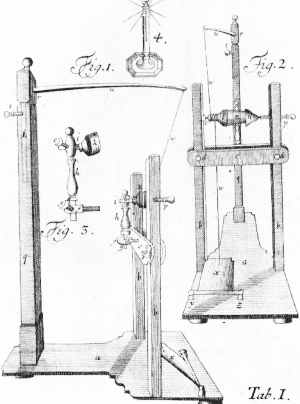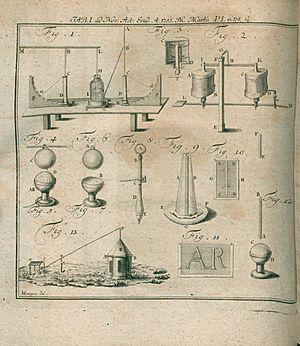Johann Heinrich Winckler facts for kids
Johann Heinrich Winckler (born March 12, 1703 – died May 18, 1770) was a German scientist and thinker. He was known for his work in physics, especially with electricity, and for his ideas about animal rights.
Contents
About Winckler's Life
His Early Years
Winckler was born in a village called Wingendorf in Silesia. He went to Leipzig University to study. One of his teachers, Andreas Rüdiger, did not agree with another famous philosopher named Christian Wolff. However, Winckler read Wolff's ideas and even defended them during his lessons.
His Career and Discoveries
In 1731, Winckler became a teacher at the Thomasschule in Leipzig. The school building was made bigger that same year. Winckler wrote the words for a special song, a cantata, to celebrate this. The famous composer Johann Sebastian Bach, who also worked at the school, wrote the music for it. The song was performed in 1732.
Winckler wrote a textbook about philosophy. It was first published in 1735. Later, in 1739, he became a professor of philosophy at Leipzig University. By 1750, he was a professor of physics. He was chosen to be the president of the university eight times!
Winckler is most famous for his experiments with electricity. In 1744, he wrote a book about his ideas on electricity. It also described two new machines he had created to make electricity. One of his inventions could even create electricity using a beer glass!
Winckler and the Royal Society
Winckler became a member of the Royal Society in 1747. This is a very old and respected group of scientists in England. The Royal Society shared information about his electricity experiments in their scientific magazine, the Philosophical Transactions.
His Ideas on Animal Rights
Between 1741 and 1743, Winckler wrote several essays about whether animals have souls. He believed that animals are intelligent and can feel things. He disagreed with the idea that animals are just like machines.
In his 1762 textbook, Institutiones Philosophiae Universae, Winckler wrote about how we should treat animals. He argued that because animals can feel pain, it is wrong to hurt them without a good reason. He said that people should cause as little pain as possible to animals, even when using them or killing them for food.
Winckler's ideas, along with those of other thinkers like Johann Friedrich Ludwig Volckmann and Richard Dean, helped to change how people thought about animals. Their work helped start the idea of protecting animals based on understanding how animals think and feel.
Some of His Books
- Institutiones Philosophiae Universae (1742, 1762)
- Untersuchung von dem Seyn und Wesen der Seelen der Thiere (1742–1745)
- Gedanken von den Eigenschaften, Wirkungen und Ursachen der Electricität: nebst einer Beschreibung zwo neuer electrischen Machinen (1744)
 | Georgia Louise Harris Brown |
 | Julian Abele |
 | Norma Merrick Sklarek |
 | William Sidney Pittman |



